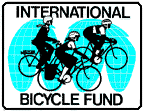Rethinking Tourism and Ecotravel

![]() IBF is 100%
IBF is 100%
solar powered
![]()
Book Review
Rethinking Tourism and Ecotravel
Reviewed by David Mozer
Tourism is said to be the world’s largest industry. It’s global. It’s got money. It’s powerful. Increasingly it is in less developed areas. And it may not be as benign as you might think. Getting it "right" is a tough challenge for tourists and eco-travelers. In general terms you want to be environmentally friendly, economically beneficial and culturally sensitive. But travel itself has a toll on the environment, it is hard to control all of the ramifications of your economic activity and anytime two bodies meet there is some degree of two-way transfer.
Certainly when you travel you can choose not to collect articles made from endangered plants, animals and marine life. You can try direct your economic activities to locally owned, produced or provided goods and services. And you can take an interest in the local culture and life-style without asking for it to be tailored to your own. This and much more is covered by Deborah McLaren in "Rethinking Tourism and Ecotravel".
For example, a cruise line received an environmental award for stopping the dumping of garbage overboard, recycling more, installing energy-efficient water treatment systems and biological sewage treatment systems and eliminating individual plastic containers of shampoo and body lotions. But cruise ships are still very self-contained for food and lodging so do relatively little to diversify and develop the economies along their paths.
And this doesn’t begin to touch the really tawdry side of tourism; people forced from their land, child prostitution, environmental destruction, "culture-on-demand", children lured from schools for a quick dollar.
A lot of the book is anecdotal. The anecdotes certainly illustrate compelling problems, but if you need quantitative data to present the issues to friends you will come up short. As McLaren points out there haven’t been many studies on tourism and numbers are hard to come by.
McLaren last chapter addresses "what you can do to stop it". The book’s sub-title overstate what is actually information on "what you can do to not contribute to the paving of paradise." It does provides a good discussion on what to consider before spending your next travel dollar. It boils down to before taking your next vacation "think and vote with your feet."
Rethinking Tourism and Ecotravel, by Deborah Mclaren, Kumarian Press, West Hartford, CT, 1997, 182 pages.
Home | About Us | Contact Us | Contributions | Economics | Education | Encouragement | Engineering | Environment | Bibliography | Essay Contest | Ibike Tours | Library | Links | Site Map | Search
![]()
The International Bicycle Fund is an independent, non-profit organization. Its primary purpose is to promote bicycle transportation. Most IBF projects and activities fall into one of four categories: planning and engineering, safety education, economic development assistance and promoting international understanding. IBF's objective is to create a sustainable, people-friendly environment by creating opportunities of the highest practicable quality for bicycle transportation. IBF is funded by private donation. Contributions are always welcome and are U.S. tax-deductible to the extent allowed by law.
![]()
![]() Please write if you have questions, comment, criticism, praise or
additional information for us, to report bad links, or if you would like to be
added to IBF's mailing list. (Also let us know how you found this site.)
Please write if you have questions, comment, criticism, praise or
additional information for us, to report bad links, or if you would like to be
added to IBF's mailing list. (Also let us know how you found this site.)
